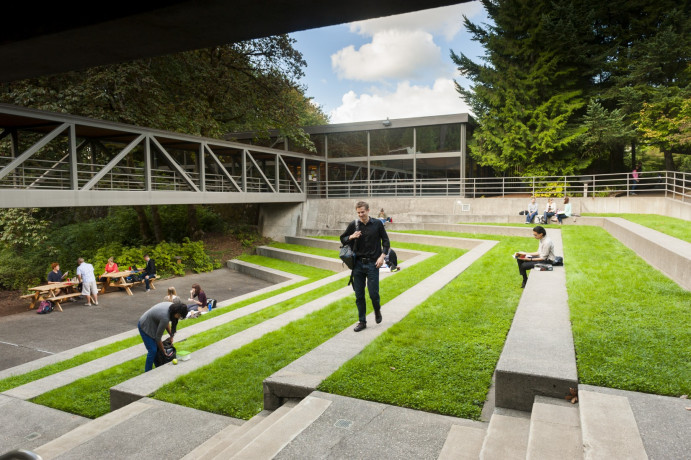The Portland, Oregon, area has two schools that offer law programs within about 50 miles of downtown. Learn about degree and certificate options as well as program requirements to make an informed education decision.
 Individuals interested in attending law school in the Portland area have a couple of options to choose from, both of which are less than an hour from the city's center. Read about the required courses and experiential opportunities at these institutions, and then review a table of stats and facts about the schools.
Individuals interested in attending law school in the Portland area have a couple of options to choose from, both of which are less than an hour from the city's center. Read about the required courses and experiential opportunities at these institutions, and then review a table of stats and facts about the schools. These certificates are presented to Juris Doctor students at graduation along with their law degrees and demonstrate that students have received additional specialized education and training in a particular area of the law. Lewis & Clark College offers certificate programs in environmental and natural resources, business, tax, intellectual property, criminal, public interest, and global law. Each certificate program has its own requirements. For example, the Certificate in Environmental and Natural Resources Law requires students to write two substantial papers on natural resources or environmental topics and earn a certain number of credits from a set curriculum.
These certificates are presented to Juris Doctor students at graduation along with their law degrees and demonstrate that students have received additional specialized education and training in a particular area of the law. Lewis & Clark College offers certificate programs in environmental and natural resources, business, tax, intellectual property, criminal, public interest, and global law. Each certificate program has its own requirements. For example, the Certificate in Environmental and Natural Resources Law requires students to write two substantial papers on natural resources or environmental topics and earn a certain number of credits from a set curriculum. Willamette University's Juris Doctor program is a 3-year course of study that requires 90 hours of credit. Law students must maintain a 2.30 grade point average throughout their final two years and complete an intensive legal research and writing requirement. First-year students undertake common courses such as legal research and writing, contracts, criminal law, torts, and civil procedure. Second-year students take three mandatory courses and then focus their coursework to meet their specific interest areas. In the final year, students continue to focus on their specific areas of interest.
Willamette University's Juris Doctor program is a 3-year course of study that requires 90 hours of credit. Law students must maintain a 2.30 grade point average throughout their final two years and complete an intensive legal research and writing requirement. First-year students undertake common courses such as legal research and writing, contracts, criminal law, torts, and civil procedure. Second-year students take three mandatory courses and then focus their coursework to meet their specific interest areas. In the final year, students continue to focus on their specific areas of interest. The university's Master of Laws in Transnational Law degree program requires a mix of domestic, international, and transnational courses in subjects like ocean law and taxation. Students expand their knowledge in areas such as international business transactions, international law, and dispute resolution. There are also study abroad programs in Germany, China, and Ecuador. This program requires 25 hours of credit and can be completed in one year. Students are also subject to a writing requirement.
The university's Master of Laws in Transnational Law degree program requires a mix of domestic, international, and transnational courses in subjects like ocean law and taxation. Students expand their knowledge in areas such as international business transactions, international law, and dispute resolution. There are also study abroad programs in Germany, China, and Ecuador. This program requires 25 hours of credit and can be completed in one year. Students are also subject to a writing requirement.
Portland Law Schools

Lewis & Clark College
Lewis & Clark College offers a first professional law degree, two advanced law degrees, and graduate certificate programs in seven areas of law. The law school was founded as a state law school in 1884 before it became the private Northwestern College of Law in 1915. It merged with Lewis & Clark College in 1965.
Juris Doctor
Lewis & Clark offers a Juris Doctor (J.D.) degree that requires 89 semester hours of credit. Upper division students take courses that focus on their areas of interest; requirements include at least one seminar course and the completion of two papers - one as part of a writing-intensive experience and one as part of a capstone experience. Completion of a course in professionalism and ethics or participation in a clinic in civil litigation for low-income clients is also required. Students have the option of completing the 4-year program in a shorter period of time by mixing full-time and part-time semesters to accommodate internships and part-time work in law offices.
Certificate Programs in Law
Master of Laws in Environmental and Natural Resources Law
Students who seek to practice law as it relates to environmental issues or pursue careers in education or public policy take courses and seminars on topics such as climate change, environmental justice law, forest law, mining and mineral law, ocean and coastal law, oil and gas law, toxic torts, water law, and Native American natural resources law. There are also internship opportunities available locally. The college offers several natural resources and environmental classes during the summer at its Environmental Summer School. Clinic options for gaining hands-on experience include the Animal Law Clinic, the Pacific Environmental Advocacy Center (PEAC), and the International Environmental Law Project (IELP).
Master of Laws in Animal Law
The college's Master of Laws in Animal Law degree is among the first advanced legal degrees in animal law in the country. This program is designed for a small total class size of about 12 students. The program requires 26 semester hours of credit. Students take required courses and seminars on animal law fundamentals and administrative law. There is also an optional written thesis.
Willamette University
Willamette University offers a first professional law degree, a joint law/MBA degree, advanced law degrees, and various certificate programs in law. The college emphasizes small enrollments, with an array of programs and specializations available.
Juris Doctor
Certificate Programs in Law
Willamette University offers certificate programs in law that focus on five subject areas: law and business, law and government, international and comparative law, dispute resolution, and sustainability law. Each certificate has unique program requirements and specialized courses that are completed in tandem with the larger degree program. For example, the Certificate in Law and Government program provides in-depth exposure to public law. It requires 20 hours of specialized study as part of the overall Juris Doctor program. Courses cover state and local government law, administrative law, constitutional law, and public policy studies. Students receive their certificates when they receive their law degrees.
Juris Doctor/Master in Business Administration
The university's 4-year Juris Doctor/Master in Business Administration joint degree program allows students to concentrate in business, management, and law. The program requires 126 semester hours, of which 72 must come from the law college. Students must apply and be admitted to both schools to be eligible for this program.
Master of Laws in Dispute Resolution
This program offers courses in mediation, arbitration, negotiation, cross-cultural dispute resolution, conflict theory, international and transnational law, and more. It's offered through the university's Center for Dispute Resolution. Career options for graduates include public service or private practice.
Master of Laws in Transnational Law

Comparison of Schools
A law school education isn't inexpensive, which is something you'll want to consider when deciding on where to apply. Take a look at this table to compare costs, enrollment numbers and more for the two profiled institutions.
| Lewis & Clark College | Willamette University | |
|---|---|---|
| School Type | 4-year; private not-for-profit | 4 year; private not-for-profit |
| Total Enrollment (2011) | 3,713* | 2,968* |
| Campus Setting | Large city | Midsize city |
| Law School Tuition (J.D. degrees; 2012-13) | $38,180** | $34,570 *** |
Source: *NCES College Navigator, **Lewis & Clark College, ***Willamette University.
Law Schools in West Virginia with Degree Program Information
Research law schools in West Virginia, which currently has only one university offering programs. Read an overview of degree programs, tuition info and program options for these schools and decide which program is right for you.
Essential Information
Students in West Virginia seeking lawyer education can look to West Virginia University, which offers a program approved by the American Bar Association. The public institution offers a stand-alone Juris Doctor. In addition, interested students can combine their Juris Doctor with a Master of Public Administration or Master of Business Administration degree. In addition to theoretical training, students are able to gain hands-on skills by participating in the school's legal clinic.
Career Requirements
In order to practice law in the United States, lawyers must meet the requirements for the state they wish to practice. To practice law in West Virginia, individuals must pass the West Virginia General Bar Exam. They must also pass the Multistate Professional Responsibility Exam within 25 months of passing the West Virginia bar. Below is an overview of the law program offered by West Virginia University.
West Virginia University
Located in Morgantown, West Virginia University offers a law degree as well as two joint degrees. During the first year of law school, students learn the fundamentals of law including procedure rules, criminal law, contracts, reasoning and writing. Beginning in the second year, students may begin to choose courses in a specialty, while completing three more required courses and a seminar. Students can also earn practical experience by participating in a clinical law program or an immigration law clinic.
The school also offers a law degree with an executive master's of business administration (JD/EMBA) and a law degree with a master's of public administration (JD/MPA). Students must apply to each school separately and can begin taking those courses related to the additional degree during the second year of law school.
School Comparison: At a Glance
| School Name | School Type & Setting | Law Degree Program(s) Offered | Program Tuition and Fees (2012-2013) |
|---|---|---|---|
| West Virginia University | 4-year; public; small city | JD, JD/EMBA, JD/MPA | $17,240 (in-state); $32,924 (out-of-state) * |
Source: *West Virginia University College of Law